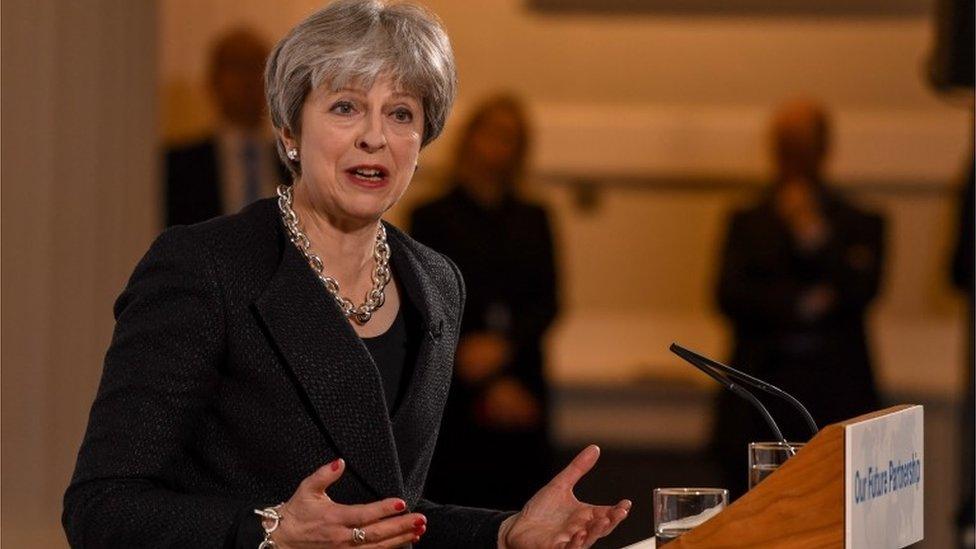Theresa May speech: Were the facts hard enough?
- Published

Yes, it was a long speech. Yes, the prime minister added a layer of detail to her Brexit plans.
Yes, there were nuggets in there about how the negotiations might proceed, including, without much fanfare, what seemed to be a statement that the EU commission would help to find a solution the Irish border question, one of the most vexed of all.
Yes, it did not provide encyclopaedic levels of information about exactly what the UK would propose. Yes, there were holes, only a few paragraphs on the biggest bit of the UK economy, services. Yes, there are still fundamental contradictions in the UK position.
And yes, the Tory infighting of recent weeks that's simmered down today will return at the next moment of decision. One senior Tory told me we might have given up on cake and eating it, ''but we're now asking for half the cake''.
And there was nothing today that suddenly revealed a real change in the government's thinking. That gives her critics cause for concern, and EU sources are emollient, rather than immediately won over.
But the message that Theresa May wanted, and arguably needed to get across, was way beyond any of the detailed arguments that lead the Tory party, the EU, or both, down a cul-de-sac. This was not intended to be the final word.
What the prime minister endeavoured to do instead was to say to the EU, let's do a deal. It won't be easy, I'm confessing to my party and the public that I won't get everything they want, but I get it, and now, after everything that's happened, let's talk.
Internal jockeying
It is legitimate of course to ask why it has taken so long for the prime minister to put that forward. Well, the EU didn't want to talk about trade initially, wanting to sort out the cash first of all.
And there have always been internal suspicions of her aims in the Tory party that have made moving forward extremely fraught. Her survival has been contingent.
But some of this comes down to the prime minister, fond of asking for more and more briefing, more and more alternatives and discussion in committees, who is reluctant to do anything in a hurry. In the coming days much will be written along the lines of ''what took her so long''?
The hope in No 10 is that the EU will welcome her newly pragmatic admission that we can't, after all that cake, really have it all. And importantly, after a fevered bout of internal jockeying, Theresa May today has been willing to tell both wings of her party they will have to compromise.
Adding some detail to her approach she more firmly than before told Brexiteers they can't dictate all the terms. And there was a message to Conservative Remainers too that she won't back down on her central intentions to leave the single market and customs union.
And for today, it seems enough. Both sides in the Tory tug-of-war have welcomed her carefully phrased lines. But accepting warnings of coming compromises is not the same as swallowing them when they happen.
If, and likely when, the European Union pushes back her proposal, Theresa May's 'hard facts' will become harder choices for the Conservative Party.
But today, she was a leader in an almost impossible political position straining to show what might just work. Politics is about principle, yes, but first and foremost what is possible. No 10 hopes that today, the prime minister will have shown the EU that is something she understands.